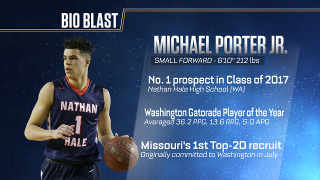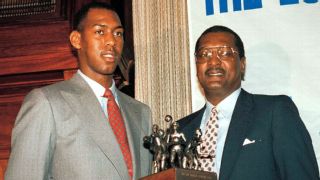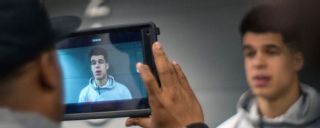|
At a four-star hotel in Oakland two months ago, Cuonzo Martin and his wife, Roberta, met with former Washington assistant Michael Porter Sr. and his wife, Lisa, for two hours. Martin, who had just accepted Missouri's seven-year, $21 million offer to become the school's head coach, says they never addressed the future of 6-foot-10 prodigy Michael Porter Jr., the top recruit in the 2017 class, who had been granted his release from Washington after Lorenzo Romar's dismissal. But they all knew the prep star's forthcoming decision had initiated that meeting. "We got to know each other," Martin told ESPN.com about his initial meeting with the elder Porter, who was then weighing his options after the Romar firing. "They wanted to make sure they felt comfortable with the relationship, if this was going to happen." Added Michael Porter Sr.: "We got a really good feel for the type of people that the Martins are, and they hopefully got a great feel for who the Porters are. In the end, we saw this as a great fit, a great match." Michael Porter Sr. would soon accept Martin's offer to become an assistant at Missouri. According to NCAA rules, coaches can hire parents of recruits as long as they're one of the three assistants on their staffs. That hiring preceded the least surprising commitment of the year from Michael Porter Jr. He was also going to Missouri. Package deals involving the parents or mentors of star athletes, a more acceptable trend in the game compared with past years, have shifted the college basketball scene in a two-month stretch -- for better or worse, depending on the program involved. Missouri evolved into an SEC contender overnight. Memphis and Washington, however, slipped into irrelevance after losing coveted father-son combinations after last season. With one move, Martin elevated Missouri. Michael Porter Jr. is the school's first McDonald's All American in nearly 20 years. Point guard Blake Harris (96th in the ESPN 100) and center Jeremiah Tilmon (43rd) followed Porter to Missouri, which now owns ESPN.com's fifth-ranked recruiting class. Jontay Porter (No. 26 recruit in the 2018 class), Michael's younger brother, may reclassify and join Missouri next season, too. A Missouri team that won just eight games last season could end a four-year drought and return to the NCAA tournament in 2017-18. The Porter family's ties to Missouri run deep. Michael Porter Sr. is a former assistant on Missouri's women's team, which features his daughters, Bri and Cierra. Lisa, his wife, is the sister of Robin Pingeton, head coach of Missouri's women's program. "If it had been some school outside the state, I don't think he'd be with my program," Martin said. Michael Porter Sr. said he never used his son as a ploy to get a job whenever he talked to coaches who were interested in hiring him. "First of all, we made it clear at every opportunity that this job offer had to be about me," he said. "I was not going to be pressuring my son to go someplace so I could have a job. It did not go down like that. It just so happens, my son and I have the kind of relationship where no matter where I was, he wanted to be there." That's the bright side of package deals. Not the only side. Romar had attempted to secure success at Washington when he hired Porter and received a commitment from his son, a projected one-and-done superstar. Romar is the godfather of the younger Porter, and he was in the elder Porter's wedding. The duo could not help Romar maintain his post after the Huskies finished 9-22 last season with likely No. 1 NBA draft pick Markelle Fultz in the lineup.  Then there's Memphis coach Tubby Smith, currently fighting through one of the most turbulent stretches of his career after both K.J. Lawson (12.3 PPG, 8.1 RPG) and Dedric Lawson (19.2 PPG, 9.9 RPG) left the program along with their father Keelon Lawson, a Tigers assistant under former coach Josh Pastner and Smith's director of basketball operations last season. Their departures capped a six-player exodus that pushed Memphis basketball into uncertainty. "The reason we are leaving: I don't think there's anything Dedric can do, as far as the University of Memphis, as far as achieving his personal goals," Keelon Lawson recently told Gary Parrish on his radio show on 92.9 FM in Memphis. Days later, a Snapchat video showing K.J. Lawson using an expletive in reference to Smith and the Memphis program emerged. K.J. Lawson later apologized on Twitter. The Memphis debacle exemplified the power parents and other attached parties can wield within programs when their presence is linked to the availability of a game-changing athlete. But the promise of Missouri's sudden rise showcases the speed with which a coach willing to oblige an inseparable tandem can alter the fate of his program. Package deals aren't new. Former Kansas coach Larry Brown hired Ed Manning, then a truck driver who'd previously played for the coach in the ABA, and scored a commitment from his son, some guy named Danny Manning who led the Jayhawks to a national title in 1988. In 2000, former Memphis coach John Calipari hired Louisville legend and friend Milt Wagner as coordinator of basketball operations. Weeks later, his son, Dajuan Wagner, the top recruit in the country, committed to Memphis. Kansas coach Bill Self made former Bartlett High School (Anchorage, Alaska) coach Ronnie Chalmers his director of basketball operations in 2005, the same year his son and elite point guard Mario Chalmers arrived at Kansas. The duo helped Kansas win three consecutive Big 12 championships and a national title in 2008, the year Ronnie Chalmers resigned and the Minnesota Timberwolves selected Mario Chalmers in the second round of the NBA draft.
In 2010, however, the NCAA, hip to the practice, outlawed the hiring of any "individual associated with a prospective Student-Athlete" for a non-coaching role two years prior to or after a recruit's expected or actual enrollment. "The line between hiring legitimate candidates for employment with a basketball program and providing a recruiting inducement is being blurred by the hiring of individuals whose primary value to an institution is in their ties to specific prospective student-athletes," the NCAA said in its explanation of the rule proposal. "I don't know if [the rule] totally changed the game, but it prevented something down the road from getting out of control," Romar told ESPN.com. This did not stop coaches from adding mentors and parents to their staffs, though. But most cases have involved exceptional talents in recent years. Ben Simmons, the No. 1 pick in the 2016 NBA draft, joined LSU and former assistant David Patrick, his godfather. After Simmons turned pro following a year without an NCAA tournament appearance, Patrick accepted a job at TCU. Wayne Tinkle hired Stephen Thompson, longtime coach of Division II Cal State-Los Angeles, as an assistant after he accepted Oregon State's offer in 2014. Stephen Thompson Jr. (ranked 63rd in the 2015 recruiting class by ESPN.com), the assistant's son, committed to Oregon State three months later. Ethan Thompson, a shooting guard ranked 39th in the 2017 recruiting class, will join the program next season. In 2014, Kevin Willard hired Dwayne Morton, the high school coach of former Seton Hall star Isaiah Whitehead. Morton left the program after Whitehead's freshman season. Baylor hired Dwon Clifton, then John Wall's AAU coach, as its director of player development in 2008. Wall picked Kentucky two years later.  And while multiple coaches sought Michael Porter Jr.'s commitment, his father enjoyed a similar recruitment process after Washington fired Romar. Romar, now Arizona's associate head coach, said the father-son package deals make up a fraction of recruiting, although he admits folks connected to prospects often offer their services or express their ambitions to become college coaches. When that occurs, the parent or mentor is usually a proven commodity. "When you hire someone like that, those are rare situations," he said. Romar had known Michael Porter Sr. for 20 years before he added him to his staff at Washington in 2016. When he asked Romar to help him break into the collegiate coaching ranks 12 years ago, he told Porter he needed more experience. The elder Porter eventually earned a job as an assistant with Missouri's women's team for six seasons before Romar hired him -- even though he hadn't promised the commitment of his son. "It was never said, 'If you hire me, you'll get my son,'" Romar told ESPN.com. "He never said that." Still, the potential outweighs the concerns for many coaches willing to explore package deals. Purdue's Matt Painter said a top prospect would make the possibility more plausible for him. "Yes, I would consider adding a player if I had to hire his coach," he said. "It depends on the quality of the player and the quality of the person who would be the coach. With all that being said, I have never done it. Most of the time, deals don't work." Added Miami's Jim Larranaga: "I've never considered it as an option. However, circumstances often impact decision-making. So I'd have to say it depends." St. Joseph's Phil Martelli echoed those sentiments. "I would judge it more on the merits of the parent or coach," he said. "Would their addition be good for the program and all associated with the team? Are they qualified and capable?" North Carolina Central's LeVelle Moton said only an elite recruit would make him think about adding the player's coach or mentor to his staff. "Yes, if the parent is qualified and if the kid is a program-changer," he said. Even Baylor's Scott Drew, who failed to get Wall after hiring his AAU coach, said he's still open to the idea. "Yes, I would, as long as it was a good fit for both the player and the coach," he said. "I wouldn't do it if it weren't a good fit for both."  Added Creighton's Greg McDermott: "I would [hire a prospect's father or coach] if they were qualified for the position." Other coaches disagree with such arrangements. "I don't think I would," Wichita State's Gregg Marshall said. "It's ethically wrong. [It's] indirectly paying for the player." Georgia Tech's Josh Pastner hired Keelon Lawson as an assistant at Memphis before the arrival of K.J. Lawson and Dedric Lawson, who both have since transferred to Kansas. Keelon Lawson not only helped Memphis sign a pair of talented siblings, the move also positioned the school in the early race for their younger brothers, Chandler (a top-25 recruit in the 2019 class) and Johnathan (an elite eighth-grader). Self will reap those benefits at Kansas now. The Lawsons' move to Lawrence could also impact the recruitment of D.J. Jeffries, their cousin and the No. 6 recruit in the 2019 class. Keelon Lawson was the head coach of Memphis prep powerhouse Hamilton High School before he joined Pastner's staff. "Sometimes, it can be, maybe not always an easy situation," Pastner said about hiring the parents or mentors of recruits. "I don't have any issue with it. It's legal. And [Keelon Lawson] was a real high school coach and was a successful high school coach. There is no issue with it. And it's allowable." Such hirings come with varied results. Michael Porter Jr. will enter 2017-18 as an SEC Player of the Year contender charged with helping Missouri rebuild its image under Martin. If he matches the hype, many will praise Martin for hiring his father. If the Tigers miss expectations -- as Washington did with Fultz and LSU did with Simmons -- some fans may wonder if it was all worth it. Martin believes the freshman star will demonstrate his worth. "Obviously with Michael Porter Jr.," he said, "you get the ball rolling."
|


